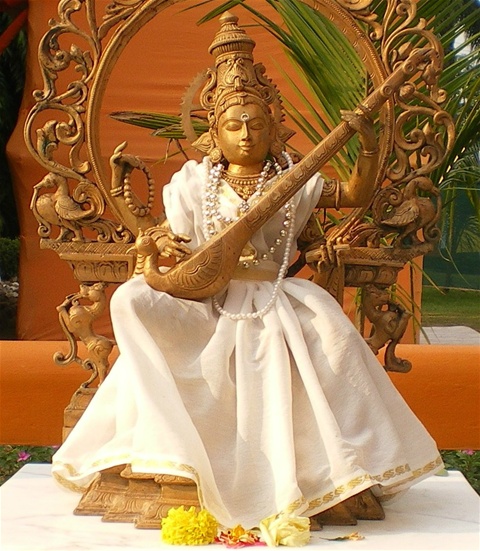descriptiondescriptiondescriptiondescriptiondescriptiondescriptiondescriptiondescriptiondescriptiondescriptiondescriptiondescriptiondescription
Samatvam yoga uchyate
Evenness of temper (equanimity) is called yoga (Bhagavad Gita Ch. 2, V. 48)
Comparative study of spirituality
 Samatvam means equanimity and refers to the natural condition of the mind which is in a calm and balanced state. Samatvam offers courses in traditional Yoga techniques as well as workshops and lectures on Yoga, Yoga philosophy, Ayurveda and other spiritual topics. Samatvam also offers Ayurvedic treatments.
The aim of Samatvam is to present authentic and classical practices from the Yoga tradition. It also aims to educate about the background of the practices and provide tools which make it possible to integrate them into daily life.
The goal is to improve the quality of life through developing an better understanding of nature, both external nature and one's inner nature, the mind. This leads to a life more in harmony with both, a life of natural balance. The word for this is samatvam.
Samatvam means equanimity and refers to the natural condition of the mind which is in a calm and balanced state. Samatvam offers courses in traditional Yoga techniques as well as workshops and lectures on Yoga, Yoga philosophy, Ayurveda and other spiritual topics. Samatvam also offers Ayurvedic treatments.
The aim of Samatvam is to present authentic and classical practices from the Yoga tradition. It also aims to educate about the background of the practices and provide tools which make it possible to integrate them into daily life.
The goal is to improve the quality of life through developing an better understanding of nature, both external nature and one's inner nature, the mind. This leads to a life more in harmony with both, a life of natural balance. The word for this is samatvam.
 Samatvam is also a platform for the exploration and comparative study of other religious and spiritual traditions, East and West. Particular emphasis is placed firstly on study and comparison of the three great spiritual traditions of the Old world, namely the Chinese (Daoist), the Indian (Vedic) and the Western (Greek) traditions. Secondly, on the recovery and reconstruciton of the Western spiritual tradition which once was a whole and unified tradition but now only exists in survivals, primarily in Christian and Islamic mysticism and folk traditions.
Samatvam is known in Greek philosophy and Christian mysticism as apatheia, which does not mean insensitivity but a balanced state of mind.
Articles will be posted regularly on the website about various spiritual topics.
Samatvam is also a platform for the exploration and comparative study of other religious and spiritual traditions, East and West. Particular emphasis is placed firstly on study and comparison of the three great spiritual traditions of the Old world, namely the Chinese (Daoist), the Indian (Vedic) and the Western (Greek) traditions. Secondly, on the recovery and reconstruciton of the Western spiritual tradition which once was a whole and unified tradition but now only exists in survivals, primarily in Christian and Islamic mysticism and folk traditions.
Samatvam is known in Greek philosophy and Christian mysticism as apatheia, which does not mean insensitivity but a balanced state of mind.
Articles will be posted regularly on the website about various spiritual topics.
Demir Baba Tekke, Bulgaria, the grave of a Sufi saint venerated by Christians and Muslims.
 The Chinese year of the Monkey has begun on Monday, February 8th, 2016. The monkey represents intelligence, ingenuity, unpredictability, playfulness and adventure.
In Indian tradition Hanuman, the monkey god, is often regarded as the patron of yoga practice. His devotion for Rama represents the lower, materialistic mind which is receptive towards the higher, the light within oneself.
The Chinese year of the Monkey has begun on Monday, February 8th, 2016. The monkey represents intelligence, ingenuity, unpredictability, playfulness and adventure.
In Indian tradition Hanuman, the monkey god, is often regarded as the patron of yoga practice. His devotion for Rama represents the lower, materialistic mind which is receptive towards the higher, the light within oneself.




